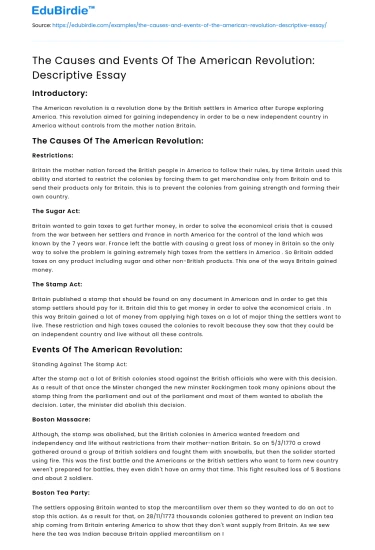Introduction
The American Revolution stands as a pivotal moment in history, marking the transformation of thirteen colonies into a sovereign nation. This revolutionary period, stretching from 1765 to 1783, was fueled by a multitude of causes ranging from economic grievances to ideological shifts. The discontent among colonists stemmed from oppressive British policies, which included taxation without representation, and the imposition of restrictive laws that curtailed their autonomy. These factors, intertwined with the Enlightenment ideals of liberty and equality, ignited a fervent desire for independence. The events leading up to the revolution, including the Boston Tea Party and the Continental Congress, reveal the escalating tensions and the eventual mobilization of a coordinated resistance. Understanding these causes and events is crucial in appreciating the complexity of the revolution and its profound impact on the formation of the United States.
Economic and Political Grievances
One of the primary catalysts of the American Revolution was the economic strife caused by British taxation policies. The imposition of the Stamp Act of 1765, which mandated a direct tax on all printed materials, was met with widespread resentment among the colonists. According to historian Bernard Bailyn, "the Stamp Act generated a torrent of protest and an unprecedented degree of colonial unity." This act was perceived as a blatant attempt by Britain to exert financial control over the colonies without their consent, encapsulated in the rallying cry of "no taxation without representation."
Save your time!
We can take care of your essay
- Proper editing and formatting
- Free revision, title page, and bibliography
- Flexible prices and money-back guarantee
Furthermore, the Townshend Acts of 1767, which imposed duties on various goods such as tea, glass, and paper, exacerbated the economic burden on the colonists. These acts not only affected merchants but also the general populace, who saw their everyday expenses rise. The economic grievances were compounded by political discontent, as the colonists felt increasingly marginalized in their ability to self-govern. The British government's dismissal of colonial assemblies and the enforcement of laws without local input heightened the sense of alienation and injustice. This growing discontent was not merely about taxes but about the broader principle of autonomy, as noted by Pauline Maier, who emphasized the colonists' "desire for self-determination and governance."
While some argue that economic factors alone were insufficient to cause a revolution, it is undeniable that they played a significant role in galvanizing public opinion. The economic and political grievances provided a fertile ground for revolutionary ideas to take root, as colonists sought not only relief from taxes but a fundamental change in their relationship with Britain.
Ideological Influences and Key Events
The ideological underpinnings of the American Revolution were deeply influenced by Enlightenment thinkers such as John Locke and Montesquieu. Locke’s theories on natural rights and government by consent resonated with the colonists, who saw their liberties being eroded by British rule. Montesquieu’s advocacy for the separation of powers further inspired the colonial push for a government that was accountable to its people. These Enlightenment ideas provided a philosophical foundation for the colonists' demands for independence and self-governance.
Key events further propelled the colonies toward revolution. The Boston Tea Party of 1773 was a direct response to the Tea Act, which granted the British East India Company a monopoly on tea sales in the colonies. This act of defiance, where colonists dumped an entire shipment of tea into Boston Harbor, symbolized the growing resistance to British authority. In retaliation, the British government enacted the Coercive Acts, known to the colonists as the Intolerable Acts, which sought to punish Massachusetts by closing Boston Harbor and revoking the colony’s charter.
The First Continental Congress convened in 1774 as a unified colonial response to these acts, marking a significant step toward organized resistance. This assembly of delegates from twelve colonies articulated their grievances and called for a boycott of British goods, showcasing a collective determination to assert their rights. While some British loyalists argued that the colonies lacked the capacity for self-rule, the growing unity among the colonists and their commitment to collective action underscored their resolve to pursue independence.
Conclusion
The American Revolution was a complex interplay of economic, political, and ideological factors, each contributing to the colonists’ quest for independence. The oppressive British policies and the denial of representation ignited a widespread demand for change, while Enlightenment ideals provided the philosophical justification for revolution. The series of events leading up to the war, including the Boston Tea Party and the Continental Congress, demonstrated the escalating tensions and the determination of the colonists to fight for their rights. Despite counterarguments emphasizing the colonies’ lack of readiness for self-governance, the revolution ultimately succeeded in establishing a nation founded on the principles of liberty and equality. By examining the causes and events of this transformative period, we gain a deeper understanding of the American Revolution's enduring legacy and its role in shaping the modern world.






 Stuck on your essay?
Stuck on your essay?

